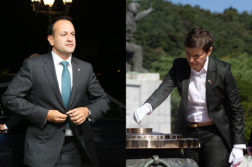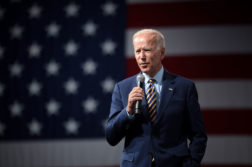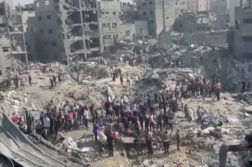In the last minutes of 2009, Russian President Dmitry Medvedev’s New Year address was beamed to television sets across Russia. It had a large audience; families everywhere were, according to Russian tradition, glued to the television, champagne in hand.
In the festive atmosphere, the President’s speech went down a treat. "We love our children!" brought smiles and "All will be well in 2010!" cheers. Standing in Red Square in the midst of an immense and unruly crowd of singing, dancing, kissing people, it was hard not to agree. But Medvedev’s speech also touched on a sombre note, when the President alluded to the difficulties encountered by Russians in 2009 as a result of the Global Financial Crisis. According to some estimates, Russia’s GDP dropped by more than 10 per cent between mid-2008 and mid-2009.
And so went the President’s message: it had been a tough year, but if every Russian family strove to live and work well, the country would right itself in 2010. Whether they believed it or not, the crowds in Red Square roared. And then the fireworks erupted.
Discussions of Russia’s resurgence since the late 1990s are often couched in the language of national power. Russia’s political elite and many commentators tend to analyse the nation’s progress in terms of its capacity to return to great power status. The negotiations surrounding conventional weapons in Europe, a new START (Strategic Arms Reduction Treaty) and Russian investments in new strategic missiles attract plenty of this kind of speculation.
But, as foreign affairs analyst Dmitry Trenin has argued, these foreign policy issues don’t tell the full story about the state of Russia’s position in 2010. On the contrary, Russia’s domestic circumstances, Trenin insists, are the true indicators of the country’s position. Corruption, low life expectancy (especially for men), woefully poor health care and a rapidly shrinking population are only the most obvious symptoms that all is not well.
Another measure of Russia’s position in 2010 is the degree of opportunity available to its young people — particularly to those who live outside the dynamic hubs of Moscow and St Petersburg. What educational and employment opportunities do young Russians have at the start of a new decade? And how adequately do these correspond to their aspirations?
Yaroslavl is an important industrial city four hours train journey north of Moscow. While it was once an important political and cultural centre, now the silver domes of Orthodox churches share the skyline with smoke stacks. The city has been a hub of Russian industry since the early 20th century, indeed, its tyre factory was the first in Russia. Now it is a centre for oil refining, chemicals production and the manufacture of industrial machinery.
Like all Russian industrial cities, Yaroslavl suffered on the demise of the Soviet Union. Industrial production in the city declined by up to 67 per cent in the immediate aftermath of perestroika. Even so, through the ensuing two decades, Yaroslavl fared relatively well and its output was only mildly affected by the 1998 financial crisis.
All that changed again with the recent Global Financial Crisis. In 2009, jobs disappeared and factories closed; many workers struggled to support themselves and their dependants on meagre part time salaries. Their struggles might not have made international deadlines, but they were quiet and desperate and unrelenting, like those of a young factory worker I met who is now dealing with health problems after working continuous day and night shifts for six months so that he could also support his unemployed parents.
In this economic climate, just having a job in Yaroslavl is counted as a blessing but young people who are yearning for more have few options while the factories offer the means merely to eke out a living.
Mikhail, a 24-year-old worker at a local petroleum plant tells me about the limitations of a Yaroslavl factory job: "I work and work and work, and I don’t know how to get promoted … I simply don’t know how to do it." This is despite the fact that Mikhail speaks English, has a degree in engineering and works hard. According to him, nepotism reigns supreme in the factory environment and what is more, the wages are so low that to own a car and be capable of supporting a family makes getting promoted vital. The prospect of earning a pittance for the rest of their working lives is, understandably, unappealing to Mikhail and his friends.
Still, factory jobs are sought after in Yaroslavl and they certainly promise more than other types of employment. Indeed, factory workers are envied by university-trained teachers.
The local university, Yaroslavl Pedagogical University, exemplifies the problems facing those working in the education sector. With its peeling walls, leaking toilets and generally inadequate facilities, the university needs buckets of money for repairs and new buildings. For those students who live in the dormitories, studying English grammar is made harder by their surroundings: they live four to a small room with only one desk between them.
Academic staff at the university don’t have their own offices and crowd into a packed staff room. As one experienced English teacher lamented, "we get paid less than some shop assistants in Yaroslavl. That’s why nobody wants to be a teacher … the students see how hard our lives are and say, ‘I’d rather be selling televisions’." Many of the university lecturers work two jobs to supplement their incomes: some work in the local produce store.
According to the staff at the university, most young graduates who do decide to become teachers work for one year before they give up and look for a job in a different sector of the economy. It is not hard to see why; the base salary for a young teacher, either in a school or a university, hovers at around 5000 rubles per month (about $200), certainly not enough to enable a move out of home.
Thus for many young people in Yaroslavl, ordinary ambitions like owning a car — not to mention owning an apartment — seem like unscalable mountains. Take Vladimir, who is a university educated archaeologist. He is 26 and fluent in English. He lives with his family and still has to work two jobs to support himself. He is constantly tired from working double shifts.
Of course, the idea of moving to Moscow or St Petersburg is a beacon of possibility to many, but with apartment prices in those two cities skyrocketing, only a small proportion of students from the regions can afford to move. Not only is opportunity scarce in Yaroslavl and other regional towns and cities, but young people find it hard to pursue opportunity elsewhere: they are locked where they are.
Yet when asked about their future, students here often say, "It’s up to me".
Elsewhere, this might signify agency and enthusiasm, that students feel free to pursue their ambitions, but in the context of a Russian regional city, "it’s up to me" is simply a recognition that no one else is going to help. It is uttered with a resigned air — and it is pretty accurate. In Yaroslavl there are no scholarships or Rotary clubs to assist students to pursue research or study. These opportunities simply do not exist.
The Kremlin’s recent policy statements suggest that investing in young people is not a high priority. Throughout Vladimir Putin’s presidency, the development of "national projects" in key areas of national requirement — health, education, housing and agriculture — loomed large on the Kremlin’s agenda. Putin did state in 2005 that "the idea of the national projects ‘is investment in people, and so, in the future of Russia’." More recently, however, Robert Coalson points out, the national projects have taken a lower profile, only being mentioned twice in Prime Minister Putin’s four-hour question and answer session in December 2009. Since the global financial crisis, "investment in people", and in particular in young people, seems to have taken a back seat.
Donate To New Matilda
New Matilda is a small, independent media outlet. We survive through reader contributions, and never losing a lawsuit. If you got something from this article, giving something back helps us to continue speaking truth to power. Every little bit counts.



